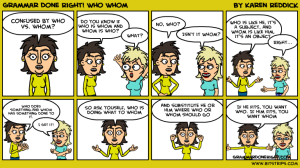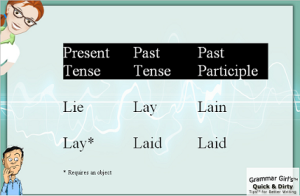
Post: Dedicated to First-Year Student Me: Thriving in Your First Year at SEU
Date: September 9, 2011
Comment:
1. Don’t lock yourself into one social group in the very beginning. Reach out and meet as many people as you can at the very beginning!
2. Get to know your professors and other mentors. They are stock full of great knowledge 
3. Don’t underestimate the power of a daily quiet time
4. Get plugged in to a church off campus
5. Drink Red Bull and coffee for those all-nighters! 

Post: Public Relations Expanded: Eight Social Roles Assigned
Date: September 10, 2011
Comment:
Great post! I appreciate all the feedback of different roles that are being added to PR. I am a public relations student, so this is great so I can get an idea of what I need to learn more about prior to fully entering the world of PR. I am minoring in Psychology, which I feel may be quite beneficial with the relationship analyzer role. However, knowing that “master of metrics” is also a new role, is good to know so that I can maybe add some business classes  Thanks for the help!
Thanks for the help!

Post: What’s the Connection Between Tumblr and Teenagers?
Date: September 10, 2011
Comment:
Nice! I’ve been wondering about Tumblr. I don’t have an account, but this post has motivated me to maybe get one. @Ann Marie, great comment about it being a bit like Twitter, with the professionalism of a blog.

Post: Way Back When… Melanie Shoults
Date: September 14, 2010
Comment:
Thanks for using my tip in here  I love the tip of talking to the people around you before class. It’s always good to create relationships with those that are in your classes and exchange phone number. This is especially helpful if you miss a class and need to find out what happened that day or just to support each other in general with assignments!
I love the tip of talking to the people around you before class. It’s always good to create relationships with those that are in your classes and exchange phone number. This is especially helpful if you miss a class and need to find out what happened that day or just to support each other in general with assignments!

Post: 12 unexpected tips for business communications
Date: 10/6/11
Comment:
Great tips! I loved your points about charisma being the “magical quality that most leaders possess.” I think your definition is pretty spot on… “These are people who look and act like winners. They are kind, empathetic, have a light sense of humor, and are known for their strength of character.” I believe a key word in this definition is “empathetic”. This definitely ties in with knowing your public on an intimate level. If you don’t begin with caring with them, why should your public care about you and what you have to say?

Post: 99 ways to improve your business communication
Date: 10/12/11
Comment:
Super useful list! I think I may just print this out and post it on my wall!
I especially like these pointers…
31. Make all important phone calls before noon.
59. Thank someone when they offer a compliment (don’t argue!)
63. Write with bullet points and white space so your information is “reader-friendly.”

Post: The Quick & Dirty by Liz Colburn
Date: 10/15/11
Comment:
Loved all these health tips! I didn’t know that before about grapes, but it definitely makes a lot of sense. Interesting also that fiber when mixed with water makes your stomach feel full. Thank you for the quick tips! And Elizabeth, that is so interesting about dried fruit! I love to snack on dried fruit because it’s yummy and I always thought it was pretty healthy.

Post: Do’s & Don’t of Business Blogging – From Ivesp.com by Daniel Barcelo
Date: 10/15/11
Comment:
Great advice! I’m just beginning a website for my youth group, and we are going to buy a template for $1,000 and going to pay $20 a month for hosting. In all, I think that it’s pretty inexpensive to have a professional looking website. I really liked #6 “Do have 10 posts written and posted before you launch the blog”. It’s definitely important to have content before launching!

Post: Now Featuring: Shonali Burke by Amanda Furmage
Date: 10/15/11
Comment:
Great guest post! I’m definitely going to check out Burke’s blog. It is always good as a PR student to soak up as much information as we can from those who excel in the field. This really goes for all fields of study. Reading a blog from an expert such as Burke really will help us learn and grow in the field of PR.

Post: Public Relations: It’s Not Kid’s Play
Date: 10/15/11
Comment:
I am a public relations student and the more I hear about the field, the more I hear about how it is, as you say, “not for the faint hearted”. I love the fast pace of the world of communications, but it can be overwhelming. As a student, I would say learning to manage my time will be what will be most beneficial to my future career. I am currently working 2 jobs and taking 17 credit hours. Balance has been key to me and learning to schedule, schedule, schedule, will keep me sane!

Post: TOW #9: Info+Graphic Round Two by Emily Meade
Date: 10/26/11
Comment:
Great post! I love the Starbucks infographic you include. What a good example of an eye-catching and informative graphic. Currently, I am taking a layout and design class and realizing the importance of having a marketable graphic. This goes with even just branding yourself as a PR professional. I hope to make a logo for myself soon! Thanks for the tips!

Post: Hmmm… What should I name this? by Mikelle Liette
Date: 10/26/11
Comment:
These are some wonderful tips! I especially like number seven: Does your personality show through your headlines? Consistency is definitely important in creating and keeping your voice throughout your blog. Your headline is a great way to create rapport with your readers. Standing out is definitely extremely important also with the overwhelming amount of similar news stories out there.
Good job!

Post: 10 Tips to Increase Your Productivity
Date: 11/14/11
Comment:
Great tips! I am always looking for ways to stay productive. I definitely agree with numbers 1 and 6 also. Every morning without fail pretty much, I make a list of what I need to accomplish that day. Without having a plan, I feel lost and overwhelmed! Also, taking short mind breaks keep me alert when I am working. Thanks for tip number 4 too! I need to get better at blocking out distractions.

Post: Why freelancing is for you. by Taylor Flumerfelt
Date: 11/17/11
Comment:
Great post, Taylor! I have never really given freelancing much thought before. But such a great idea! I really wish I had known sooner so I could’ve been building my portfolio sooner (considering I graduate in May) but I think I’m going to try to get some freelancing next semester. Any suggestions where or how to get freelancing opportunities?

Post: Japan Mission Trip by Johny Fernandez
Date:11/17/11
Comment:
I can’t wait to go to Japan! We are leaving in T-14 hours. So crazy! I would love to blog while I’m over there to remember the experience because I believe that one of our responsibilities as journalists is to share the stories of other people. This trip is going to be life changing!

Post: THINKHOUSE- Communicating with youth. by Elizabeth Telg
Date: 11/17/11
Comment:
Very cool! I love that you are thinking ahead and researching PR firms that you would potentially like to work for! Checking out an organization’s website is incredibly important to learn what they are about, and the kind of atmosphere they like to cultivate in their workplace.
Thinkhouse sounds incredibly creative and trendy, so you can begin to tailor your resume for more of a casual, fun-loving, spunky tone. It would probably be a good idea to reach out to a current employee and just introduce yourself and say “Hey, I’d love to work with this organization someday! What are some things I can begin doing now?” It’ll show initiative and that you are truly interested in working with them! Keep up the good work!

Post: TED Talk by Eli Pariser: Beware online “filter bubbles” by Barbara Nixon
Date: 11/17/11
Comment:
This was definitely an eye-opener! Personalization on the internet is nice to a certain extent, like Melanie is saying, because it filters out the tons of information that is on there and puts in the forefront what they believe we would like to see, but this is forming very one-sided opinionated people. Individuals need to broaden their horizons and read on different perspectives to stretch themselves.

Post: Does Participatory Journalism Contribute to the Decline or the Solution of Traditional News Media by Nick Tedeschi
Date: 11/19/11
Comment:
I like the quote about how Twitter is used by News Organizations! Being limited to to 140 characters really forces me to be concise in my writings and still get my point across. Which really is qualities of good online journalism!
Also the part of how participatory journalism will affect the future of journalism is interesting. Since journalists will spark a discussion, rather than just lecture, I feel as though the communications degree is more important than ever to learn how to not only be proactive, but also reactive to what people are saying.

Post: Photos from Morocco: It’s All in the Details
Date: 11/19/11
Comment:
Nice post! I just arrived in Japan to help with the disaster relief and I want to blog about my time here! I was looking up travel blogs and ran across yours. I love all the pictures in your post that tell a story of the place itself. Unfortunately, my camera is not as nice as yours. I just have a point-and-shoot digital. But maybe I can make it work 🙂

Post: In The Ring We Have Facebook Versus Google by Naida Lindberg
Date: 11/19/11
Comment:
I feel like this happens often! But usually it’s not about bad-mouthing another company, just building up their own. People are hired all the time to blog about a product so that others will buy it. I guess why would it be different to hire someone to talk badly about a company? I wonder what the legalities are in this?









Blog Comments
10 SepPost: Dedicated to First-Year Student Me: Thriving in Your First Year at SEU
Date: September 9, 2011
Comment:
1. Don’t lock yourself into one social group in the very beginning. Reach out and meet as many people as you can at the very beginning!
2. Get to know your professors and other mentors. They are stock full of great knowledge
3. Don’t underestimate the power of a daily quiet time
4. Get plugged in to a church off campus
5. Drink Red Bull and coffee for those all-nighters!
Post: Public Relations Expanded: Eight Social Roles Assigned
Date: September 10, 2011
Comment:
Great post! I appreciate all the feedback of different roles that are being added to PR. I am a public relations student, so this is great so I can get an idea of what I need to learn more about prior to fully entering the world of PR. I am minoring in Psychology, which I feel may be quite beneficial with the relationship analyzer role. However, knowing that “master of metrics” is also a new role, is good to know so that I can maybe add some business classes Thanks for the help!
Thanks for the help!
Post: What’s the Connection Between Tumblr and Teenagers?
Date: September 10, 2011
Comment:
Nice! I’ve been wondering about Tumblr. I don’t have an account, but this post has motivated me to maybe get one. @Ann Marie, great comment about it being a bit like Twitter, with the professionalism of a blog.
Post: Way Back When… Melanie Shoults
Date: September 14, 2010
Comment:
Thanks for using my tip in here I love the tip of talking to the people around you before class. It’s always good to create relationships with those that are in your classes and exchange phone number. This is especially helpful if you miss a class and need to find out what happened that day or just to support each other in general with assignments!
I love the tip of talking to the people around you before class. It’s always good to create relationships with those that are in your classes and exchange phone number. This is especially helpful if you miss a class and need to find out what happened that day or just to support each other in general with assignments!
Post: 12 unexpected tips for business communications
Date: 10/6/11
Comment:
Great tips! I loved your points about charisma being the “magical quality that most leaders possess.” I think your definition is pretty spot on… “These are people who look and act like winners. They are kind, empathetic, have a light sense of humor, and are known for their strength of character.” I believe a key word in this definition is “empathetic”. This definitely ties in with knowing your public on an intimate level. If you don’t begin with caring with them, why should your public care about you and what you have to say?
Post: 99 ways to improve your business communication
Date: 10/12/11
Comment:
Super useful list! I think I may just print this out and post it on my wall!
I especially like these pointers…
31. Make all important phone calls before noon.
59. Thank someone when they offer a compliment (don’t argue!)
63. Write with bullet points and white space so your information is “reader-friendly.”
Post: The Quick & Dirty by Liz Colburn
Date: 10/15/11
Comment:
Loved all these health tips! I didn’t know that before about grapes, but it definitely makes a lot of sense. Interesting also that fiber when mixed with water makes your stomach feel full. Thank you for the quick tips! And Elizabeth, that is so interesting about dried fruit! I love to snack on dried fruit because it’s yummy and I always thought it was pretty healthy.
Post: Do’s & Don’t of Business Blogging – From Ivesp.com by Daniel Barcelo
Date: 10/15/11
Comment:
Great advice! I’m just beginning a website for my youth group, and we are going to buy a template for $1,000 and going to pay $20 a month for hosting. In all, I think that it’s pretty inexpensive to have a professional looking website. I really liked #6 “Do have 10 posts written and posted before you launch the blog”. It’s definitely important to have content before launching!
Post: Now Featuring: Shonali Burke by Amanda Furmage
Date: 10/15/11
Comment:
Great guest post! I’m definitely going to check out Burke’s blog. It is always good as a PR student to soak up as much information as we can from those who excel in the field. This really goes for all fields of study. Reading a blog from an expert such as Burke really will help us learn and grow in the field of PR.
Post: Public Relations: It’s Not Kid’s Play
Date: 10/15/11
Comment:
I am a public relations student and the more I hear about the field, the more I hear about how it is, as you say, “not for the faint hearted”. I love the fast pace of the world of communications, but it can be overwhelming. As a student, I would say learning to manage my time will be what will be most beneficial to my future career. I am currently working 2 jobs and taking 17 credit hours. Balance has been key to me and learning to schedule, schedule, schedule, will keep me sane!
Post: TOW #9: Info+Graphic Round Two by Emily Meade
Date: 10/26/11
Comment:
Great post! I love the Starbucks infographic you include. What a good example of an eye-catching and informative graphic. Currently, I am taking a layout and design class and realizing the importance of having a marketable graphic. This goes with even just branding yourself as a PR professional. I hope to make a logo for myself soon! Thanks for the tips!
Post: Hmmm… What should I name this? by Mikelle Liette
Date: 10/26/11
Comment:
These are some wonderful tips! I especially like number seven: Does your personality show through your headlines? Consistency is definitely important in creating and keeping your voice throughout your blog. Your headline is a great way to create rapport with your readers. Standing out is definitely extremely important also with the overwhelming amount of similar news stories out there.
Good job!
Post: 10 Tips to Increase Your Productivity
Date: 11/14/11
Comment:
Great tips! I am always looking for ways to stay productive. I definitely agree with numbers 1 and 6 also. Every morning without fail pretty much, I make a list of what I need to accomplish that day. Without having a plan, I feel lost and overwhelmed! Also, taking short mind breaks keep me alert when I am working. Thanks for tip number 4 too! I need to get better at blocking out distractions.
Post: Why freelancing is for you. by Taylor Flumerfelt
Date: 11/17/11
Comment:
Great post, Taylor! I have never really given freelancing much thought before. But such a great idea! I really wish I had known sooner so I could’ve been building my portfolio sooner (considering I graduate in May) but I think I’m going to try to get some freelancing next semester. Any suggestions where or how to get freelancing opportunities?
Post: Japan Mission Trip by Johny Fernandez
Date:11/17/11
Comment:
I can’t wait to go to Japan! We are leaving in T-14 hours. So crazy! I would love to blog while I’m over there to remember the experience because I believe that one of our responsibilities as journalists is to share the stories of other people. This trip is going to be life changing!
Post: THINKHOUSE- Communicating with youth. by Elizabeth Telg
Date: 11/17/11
Comment:
Very cool! I love that you are thinking ahead and researching PR firms that you would potentially like to work for! Checking out an organization’s website is incredibly important to learn what they are about, and the kind of atmosphere they like to cultivate in their workplace.
Thinkhouse sounds incredibly creative and trendy, so you can begin to tailor your resume for more of a casual, fun-loving, spunky tone. It would probably be a good idea to reach out to a current employee and just introduce yourself and say “Hey, I’d love to work with this organization someday! What are some things I can begin doing now?” It’ll show initiative and that you are truly interested in working with them! Keep up the good work!
Post: TED Talk by Eli Pariser: Beware online “filter bubbles” by Barbara Nixon
Date: 11/17/11
Comment:
This was definitely an eye-opener! Personalization on the internet is nice to a certain extent, like Melanie is saying, because it filters out the tons of information that is on there and puts in the forefront what they believe we would like to see, but this is forming very one-sided opinionated people. Individuals need to broaden their horizons and read on different perspectives to stretch themselves.
Post: Does Participatory Journalism Contribute to the Decline or the Solution of Traditional News Media by Nick Tedeschi
Date: 11/19/11
Comment:
I like the quote about how Twitter is used by News Organizations! Being limited to to 140 characters really forces me to be concise in my writings and still get my point across. Which really is qualities of good online journalism!
Also the part of how participatory journalism will affect the future of journalism is interesting. Since journalists will spark a discussion, rather than just lecture, I feel as though the communications degree is more important than ever to learn how to not only be proactive, but also reactive to what people are saying.
Post: Photos from Morocco: It’s All in the Details
Date: 11/19/11
Comment:
Nice post! I just arrived in Japan to help with the disaster relief and I want to blog about my time here! I was looking up travel blogs and ran across yours. I love all the pictures in your post that tell a story of the place itself. Unfortunately, my camera is not as nice as yours. I just have a point-and-shoot digital. But maybe I can make it work 🙂
Post: In The Ring We Have Facebook Versus Google by Naida Lindberg
Date: 11/19/11
Comment:
I feel like this happens often! But usually it’s not about bad-mouthing another company, just building up their own. People are hired all the time to blog about a product so that others will buy it. I guess why would it be different to hire someone to talk badly about a company? I wonder what the legalities are in this?